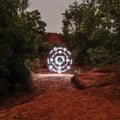Sarathy Korwar has a light touch behind the drum kit. Since debuting with 2016’s Day to Day, where he mixed the folk music of the Siddi community from rural Gujarat with west African rhythms and Indian classical melodies, Korwar’s playing has been soft and subtle enough to encompass the intricacies of disparate rhythms, while still possessing a grounded metronomic solidity. Korwar makes himself heard not through power and volume, but in the guiding steadiness of his hand.

On his fourth album as a bandleader, Korwar reaches the apex of this open drumming technique. Made in collaboration with electronic producer Photay, Kalak is a beguiling body of work, enveloping the listener in undulating synth melodies, layered horn fanfares and vocal features – all driven forward by Korwar’s ever-present percussion.
Opening with To Remember, a track that highlights the interweaving of Tamar Osborn’s flute and Korwar’s minimal tabla lines, Kalak deepens and darkens as it progresses. Utopia Is a Colonial Project thunders over a rollicking syncopated beat and the thick buzz of synths played by keyboardist Danalogue, while the dubby bassline of Remember Begum Rokheya anchors a complex polyrhythm of handclaps, flute and chanted vocals. Throughout, Photay’s reverb-laden sound design provides a unique and sinister texture.
That Clocks Don’t Tell But Make Time is the thematic centrepiece of Kalak, looping drum rhythms into each other as if playing out overlapping lines of dialogue. It is a virtuosic performance, producing a hypnotic, endless rhythm. Like the palindrome of the record’s title, Korwar’s beats spiral outwards and fold in on themselves, creating a mesmerising story of their own.
Also out this month
Colombian experimentalist Lucrecia Dalt’s latest album, ¡Ay! (Rvng), is a gorgeous blend of bolero, salsa and modular synths, anchored by her crystalline falsetto. Acoustic textures are warped by digital distortion to create a deeply atmospheric and engaging 10 tracks. Sitarist Ami Dang brings her distinctive vocals to the fore on The Living World’s Demands (Phantom Limb), traversing ambience and experimentalism – although more focus on the sitar itself would be welcome. Trumpeter Hermon Mehari produces a propulsive, jazz-inflected take on Eritrean folk music with Asmara (Komos), channelling a free-flowing swing on Call Me Habesha.
Stay connected with us on social media platform for instant update click here to join our Twitter, & Facebook
We are now on Telegram. Click here to join our channel (@TechiUpdate) and stay updated with the latest Technology headlines.
For all the latest Music News Click Here
